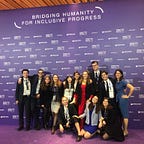COVID-19 — Green Linings
This piece was originally published on March 22, 2020 on LinkedIn.
No-one would wish Coronavirus on the world, or see it as anything less than an unprecedented, global catastrophe. However, there may be some small shoots of optimism.
The still-developing story of COVID-19 has already resulted in unintended consequences that might do more to advance climate action than all the efforts of think tanks, inter-government pacts and scientific predictions combined. Across the world, we are seeing people reconnect with their environment.”
CO2 EMISSIONS
The slowdown in economic activity resulting from COVID-19 has already had unintended consequences that could leave December 2019 as the peak of CO2 emissions. Satellite imagery of China shows clear skies in February 2020 compared to the deep orange of nitrogen oxide pollution just a month before. One Stanford University expert, Marshall Burke, believes between 50,000 and 75,000 premature deaths have been prevented already, simply due to cleaner air across the country.
“The reductions in air pollution in China caused by this economic disruption likely saved 20 times more lives in China than have currently been lost due to infection with the virus in that country,” he wrote on online scientific research platform G-Feed.
While in New York City, the bike-sharing company owned by Lyft, CitiBike, has seen a 67% increase month-on-month in rides. Citizens are abandoning subways and public transportation in favour of pedalling their way around the city, encouraged by Mayor de Blasio.
UNITY
Social media sites across the world are being repurposed to unite communities. There are community action groups that deliver groceries and medicines to the vulnerable, elderly and isolated; there are on-line choirs that use video platforms like Zoom to connect hundreds of singers together virtually; and across the world people are discovering how they can work productively from home. Using collaborative software such as Slack, we may be entering a new era in which we no longer commute to work, with all the attendant ills of pollution and lost time, but allow work to come to us.
#THE FUTURE WE CHOOSE
As Christiana Figueres and Tom Rivett-Carnac argue in their new book. The Future We Choose: Surviving the Climate Crisis, we have unintentionally wreaked havoc on the ecosystems that sustain us over decades. We have been sleepwalking into this present. But we have a choice — a choice that is now being presented to us in these and many other living examples. We can choose a “world in which we can all breathe, the air is fresh. Nature is thriving. Entire populations have a better quality of life.”
NEW-FOUND TRUST
Governments are in a unique position as we all look to them to mobilise war-like economic, social and health support. They could use this new-found trust to accelerate the move to greener industries and more sustainable ways to live, funnelling investment accordingly.
Ironically, just as social distancing brings a halt to our physical interactions, we are rediscovering what it means to connect with each other and our environment.
